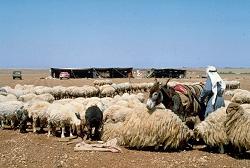Using AI to control energy for indoor agriculture
30 September 2024
Published online 27 March 2010

A few thousand years ago, farmers in the Fertile Crescent — the sickle-shaped region stretching from modern-day Egypt through Lebanon, Syria, southern Turkey and Iraq — gave birth to modern agriculture, and, in turn, provided a foundation from which modern societies and human civilization could grow and prosper. Many of the world's major food crops, including wheat, originated in the region.
Nearly 10,000 years later, the food situation in the region where domesticated farming began is now among the most volatile in the world. Rising food prices in 2008 sent thousands onto the streets in protest. Today, the Middle East and North Africa (MENA) region is the most dependent on food imports, and projections indicate that this reliance will increase dramatically over the next two decades.
For governments in the MENA region, the challenges of population growth, climate change, impending water shortages and desertification pose a significant threat to regional efforts to reduce poverty and to ensure food security for millions.
A 'perfect storm' is approaching 'the cradle of agriculture'.
In response to these dire forecasts, governments have been quick to respond with the policy reforms needed to expand safety nets for the poor and to attract new investments in the agricultural sector, including agricultural research.
Increasing investments in agricultural research and development should be a top priority for governments in the region. Over the years, consistently high rates of return have been demonstrated for agricultural research. Despite average rates of return of 36% in Arab countries, however, the agricultural research sector receives less funding than in any other region in the world.
Another promising development is that agricultural ministers from several countries in the region, including Egypt, Saudi Arabia, Yemen, Oman, Afghanistan, Tunisia and Syria, will attend the first ever Global Conference on Agricultural Research for Development (GCARD) in Montpellier, France, from 28 to 31 March 2010. These ministers, along with other political leaders, scientists, farmers and representatives of civil society, will lend their voices to a new effort to reform the agricultural research agenda and mobilize themselves as part of a community working together to improve the agricultural-research-for-development system.
This effort comes at a critical time. Recent droughts in the region have demonstrated the realities of climate change. Recent global food and financial crises have also demonstrated the vulnerability of the region to global economic change. Urgent actions are needed now to make the region's farming systems more resilient to a changing environment.
Farmers in the MENA region are accustomed to raising their crops and livestock in a harsh environment. Today, however, they need scientists to help them adapt their farming systems to the uncertainties generated by climate change, and to develop new productive options that link them securely to markets. Farmers also need science to help develop new crop varieties and management practices to ensure that reliable harvests can be achieved sustainably without exhausting already scarce water resources.
Uniquely, GCARD will bring together individuals who are generating and using agricultural knowledge — whether in laboratories or villages — to share ideas and experiences that will inform a strategy for addressing these challenges. In some cases, we might have to rethink and cast aside old approaches to solve new problems.
For example, climate change will affect rainfall and temperature patterns. This will have a direct impact on already scarce water supplies in most countries in the region. Access to water has a direct impact on access to food. To avert future food, economic and social crises, we must form a united front to address water use in agriculture today.

Scientists cannot tackle these problems alone. Farmers are under constant pressure to produce greater quantities of food crops for rapidly expanding populations. This increases the pressure on the land through continuous cropping and intensification of agricultural land use. Together with shifting dietary needs and persistent water shortages, this increases the demands on science to solve problems.
We are therefore calling for change that will create a system for communicating knowledge to farmers, while also allowing them to influence researchers and the choices that they make about which problems to study and which solutions to pursue.
This call for change coincides with reforms being carried out by the Consultative Group on International Agricultural Research (CGIAR) — a global alliance comprising some 8,000 researchers — intended to enhance its ability to fulfil its mandate to fight poverty and hunger while conserving the environment. These reforms in the international system must be coupled with reforms and new investments at the national level, to make sure that the results delivered by research can be used by farmers and that international efforts are linked with national strategies to improve food security.
One of the international centres supported by the CGIAR is the International Center for Agricultural Research in the Dry Areas (ICARDA), which has a global mandate for improving agriculture in dry places including the MENA countries. ICARDA has been carrying out agricultural research in the region for more than 30 years, in partnership with national research, extension and development institutions.
The Middle East pioneered the first innovations in agriculture, and it is now time for us to rise to the challenge and help to bring forth a farmer-focused approach to research and development for the twenty-first century. This transformation will not be easy, and will need unwavering support from governments, farmers, scientists, and other leaders in the public and private sectors.
For the MENA region, time is of the essence.
Adel El-Beltagy is the outgoing chair of the Global Forum on Agricultural Research (GFAR); Mahmoud Solh is the director general of the ICARDA.
doi:10.1038/nmiddleeast.2010.126
Stay connected: